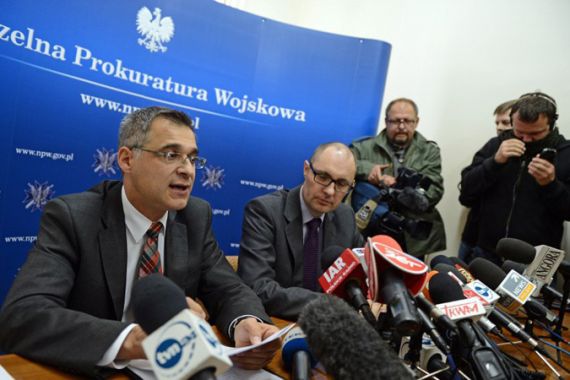Poland denies explosives found on crashed jet
Polish military prosecutors say a newspaper report alleging explosives traces were found on wreckage is not true.

Polish military prosecutors have denied a newspaper report that said investigators had found traces of explosives in the 2010 plane crash in Russia, which killed Polish President Lech Kaczynski and 95 others.
Rzeczpospolita daily said on Tuesday that Polish investigators who examined the remains of the plane in Russia found signs of TNT and nitro-glycerine on the wings and in the cabin, including on 30 seats.
Keep reading
list of 4 items‘Mama we’re dying’: Only able to hear her kids in Gaza in their final days
Europe pledges to boost aid to Sudan on unwelcome war anniversary
Birth, death, escape: Three women’s struggle through Sudan’s war
The report strengthened accusations by rightists groups that investigators ignored evidence of outside involvement and prompted opposition leader Jaroslaw Kaczynski, the twin brother of Lech, to call for the government to resign.
“We demand the resignation of the government of (Prime Minister) Donald Tusk,” Kaczynski told reporters. “It cannot be that Poland is governed by people who have obfuscated for 30 months in the matter of what we can now say is a heinous crime.”
Ireneusz Szelag, a spokesman for military prosecutors, said experts who examined the wreckage in recent weeks in Russia detected no explosives on plane parts or at the site of the crash.
He said, however, that some chemical substances were found on parts of the wreckage that will be submitted for laboratory tests. It will take months to name those substances, he said.
“It isn’t true that tests have revealed traces of trotyl and nitroglycerin on and inside the wreckage,” Szelag told reporters.
“Evidence and opinions collected so far have in no way provided support to the belief that the crash was a result of actions by third parties, that is to say an assassination,” he told a news conference.
The Rzeczpospolita daily later said on its website that it “made a mistake” writing about those two chemicals.
Its story reignited accusations from the opposition and some victims’ families that the crash in heavy fog on approach to the rudimentary military airport in Smolensk was an assassination.
The crash was Poland’s worst tragedy since World War II and it has deeply divided Poles on what could be its cause.
A government report in 2011 blamed the crash on human error coupled with bad weather and airport conditions, but excluded any explosion as causing it.
Moscow and Warsaw have faced renewed criticism over their handling of the Smolensk investigation after Polish prosecutors admitted last month that families of two of the victims received and buried the wrong remains.
On Tuesday, Szelag said two more bodies were mis-identified and lawyers for families of other victims feared more remains may need to be exhumed.